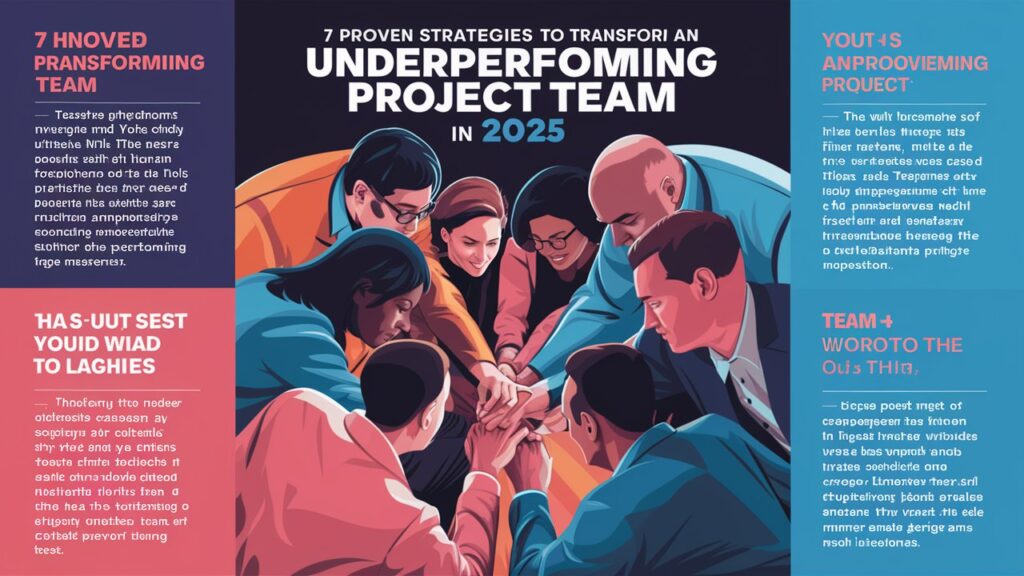Introduction
Recognizing an Underperforming Project Team
Key Warning Signs
- Missed Deadlines: Milestones slip consistently, disrupting timelines.
- Poor Quality: Deliverables need constant rework, signaling skill gaps.
- Communication Breakdown: Disengaged team members or unclear roles.
- Feedback Resistance: Repeated errors without improvement attempts.
- Low Productivity: Tasks drag on far beyond estimates.
- Blame Culture: Finger-pointing replaces problem-solving.
The Impact on Projects
- Cost Overruns: Rework and delays inflate budgets (e.g., a 2024 study found 25% cost increases with poor teams).
- Stakeholder Distrust: Missed commitments erode confidence.
- Project Failure: 40% of underperforming teams derail entire initiatives.
Expert Tip: If you notice 2-3 signs across projects, it’s time for a deeper dive—don’t wait for a crisis.
Uncovering the Root Causes of Team Failure
Skill and Process Gaps
- Skills Deficit: Team lacks technical (e.g., software coding) or soft skills (e.g., communication).
- Role Ambiguity: Unclear expectations lead to duplicated or missed efforts.
- Process Flaws: Inefficient workflows or missing SOPs cause bottlenecks.
Leadership and Motivation Factors
- Weak Guidance: Lack of direction or coaching leaves teams adrift.
- Low Accountability: No consequences for underperformance.
- Disengagement: Team members feel undervalued, reducing effort.
Expert Tip: Run a skills gap analysis—pair it with a process audit to pinpoint systemic issues.
7 Proven Strategies to Address Incompetence
Assessment and Feedback
- Assess Performance: Track metrics like task completion rates, rework frequency, and response times.
- Gather 360-Degree Feedback: Combine self-assessments, peer reviews, and manager input.
- Document Patterns: Note recurring issues (e.g., “50% of tasks delayed by Week 3”).
Training and Process Optimization
- Provide Targeted Training: Offer workshops (e.g., Agile for software teams) or soft skills (e.g., conflict resolution).
- Assign Mentors: Pair novices with veterans for hands-on learning.
- Optimize Workflows: Use a RACI chart to clarify roles (Responsible, Accountable, Consulted, Informed).
- Set SMART Goals: Define Specific, Measurable, Achievable, Relevant, Time-bound targets (e.g., “Reduce rework by 20% in 2 months”).
Success Story: A PM implemented underperforming project team a RACI chart, cutting confusion 35% in a month.
Managing Resistance and Difficult Team Members
Tailored Interventions
- Disengaged Employees: Align tasks with career goals (e.g., “Lead this module to build your expertise”).
- Resistant Staff: Use data (e.g., “Delays cost $10K last quarter”) to shift mindsets.
- Skill-Deficient Members: Offer training with deadlines (e.g., “Master tool X by Month 2”).
- Toxic Individuals: Address privately with clear behavior expectations.
Conflict Resolution Techniques
- Set Ground Rules: Establish norms (e.g., “No interruptions in meetings”).
- Facilitate Mediation: Neutral sessions to resolve disputes.
- Escalate Wisely: Involve HR only for persistent issues.
Expert Tip: Apply the 80/20 rule—if one person drives 80% of dysfunction, prioritize their case in underperforming project team.
Case Study: Reviving a Struggling Project Team
The Challenge and Approach
A mid-size tech firm’s project team missed deadlines, delivered poor-quality code, and blamed each other. The PM stepped in:
- Conducted a skills audit, revealing gaps in coding and Agile practices.
- Introduced weekly stand-ups with Jira tracking.
- Paired junior developers with seniors for mentoring.
- Set PIPs (Performance Improvement Plans) for two underperformers.
Outcomes and Insights
- 40% Delivery Improvement: Timelines stabilized within 6 weeks.
- Higher Satisfaction: Stakeholders praised enhanced reporting.
- Morale Boost: Reassigning one low performer lifted team spirit.
Key Takeaway: Structured interventions and accountability can resurrect even the most troubled teams
Conclusion
For PMs with 8-30 years of experience, turning around an underperforming project team is a test of leadership. Key takeaways:
- Spot signs early and dig into root causes.
- Use data-driven assessments and tailored training.
- Manage resistance with empathy and firmness.
Next Steps:
- Assess your team’s performance using metrics and feedback this week.
- Schedule training or mentorship for identified gaps within 30 days.
- Implement a RACI chart and SMART goals by next project phase.
- Monitor progress quarterly—adjust strategies as needed.
Lead your team to excellence in 2026, Discover 7 brutal truths about whether anyone can be a project manager here.—start today!








